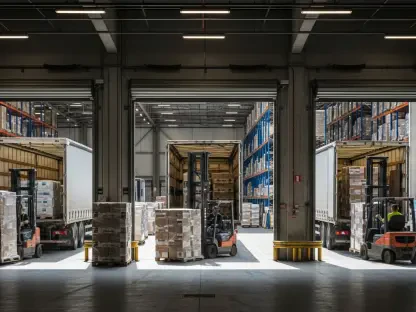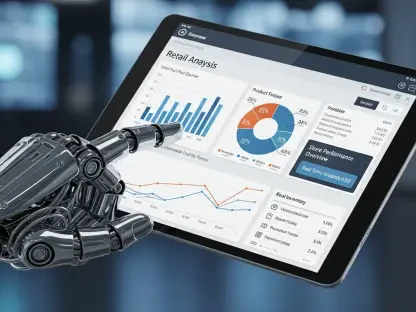Artificial Intelligence is poised to revolutionize countless industries, but perhaps one of its most immediate and impactful applications can be found in the transportation and logistics sector. The recent initiative by Sumitomo Rubber Industries (SRI) in collaboration with the Japanese logistics group Logisteed exemplifies how AI predictive maintenance can significantly enhance trucking efficiency and safety. This groundbreaking joint project integrates SRI’s advanced tire pressure and temperature management services into Logisteed’s digital platform, “smart & safety connect vehicle” (SSCV). At its core, this technology aims to mitigate the prevalent issues of truck breakdowns and operational downtimes by meticulously tracking and analyzing critical parameters, including acceleration, location, load weight, tire wear, puncture frequency, and air-pressure management.The collaboration between SRI and Logisteed is particularly timely as Japan’s recent extension of the “labor standard act” to the transportation sector imposes stricter regulations on truck drivers’ overtime. This legislative change has exacerbated the existing shortage of trucks on the roads, necessitating innovative solutions to maintain and enhance transport capacity. The project not only aims to optimize efficiency but also focuses on enhancing driver safety and ensuring seamless operations with minimal disruptions. By integrating these advanced monitoring services into Logisteed’s SSCV platform, this collaborative effort highlights the indispensable role of preemptive maintenance in modern trucking logistics.
Leveraging Digital and AI-Based Solutions
A significant trend highlighted by the SRI-Logisteed initiative is the deployment of AI-based solutions to proactively identify and address potential tire failures and maintain vehicle health. This broader objective aligns with SRI’s long-term vision to develop a comprehensive “breakdown prediction solution service” covering multiple facets of vehicle operations and maintenance. This strategic move indicates an industry-wide shift towards leveraging digital platforms and smart monitoring to enhance logistical efficiencies and avert potential breakdown scenarios. Proactive tire maintenance backed by AI can detect early warning signs that might otherwise go unnoticed until they lead to significant malfunctions or accidents. By continuously monitoring tire-related metrics, AI systems can send real-time alerts about irregularities, allowing for immediate corrective actions before any catastrophic failures occur on the road.The application of AI in tire failure prediction extends beyond just preventing mishaps; it also optimizes the scheduling of maintenance activities and reduces unscheduled downtimes. Enhanced predictive capabilities mean trucks can be taken out of service for maintenance only when necessary, thereby maximizing their operational availability and efficiency. This strategic use of AI enhances not only operational efficiency but also cost-effectiveness by reducing wasteful repair expenses and prolonging the lifespan of truck tires. Ultimately, the integration of digital and AI-based solutions represents a paradigm shift in logistics, emphasizing the long-term benefits of adopting advanced technologies for preemptive vehicle maintenance.
Addressing Industry Challenges with Proactive Solutions
The recent legislative changes in Japan underscore the need for technological integration in logistical operations to manage efficiency amid regulatory demands and labor shortages. By concentrating on detailed and proactive monitoring of tire-related metrics, SRI and Logisteed aim to ensure higher operational readiness and safety within the trucking industry. Truck drivers are directly impacted as stringent regulations limit allowable working hours, subsequently increasing the demand for well-maintained and efficient vehicles that can maximize productivity within restricted timeframes. Here, AI predictive maintenance systems come into play by ensuring that vehicles are always in top condition, thereby reducing the likelihood of breakdown-induced delays and enhancing overall driver safety.In addition to improving on-road safety and efficiency, AI-driven predictive maintenance initiatives have broader implications for the trucking industry. By reducing the frequency and severity of tire-related incidents, these technologies contribute to lower accident rates and diminished insurance costs, fostering a safer and more sustainable logistics network. Furthermore, proactive maintenance practices can also enhance environmental sustainability by ensuring vehicles operate at optimal efficiency, thus reducing fuel consumption and emissions. The collaborative effort between SRI and Logisteed exemplifies how innovative technological solutions can help address the intricate challenges facing the trucking industry today.
Enhancing Operational Readiness and Safety Standards
Artificial Intelligence is set to transform numerous industries, with one of its most immediate and impactful uses appearing in the transportation and logistics sector. Sumitomo Rubber Industries (SRI) has recently teamed up with the Japanese logistics group Logisteed to illustrate how AI predictive maintenance can greatly improve trucking efficiency and safety. This innovative project combines SRI’s advanced tire pressure and temperature management services with Logisteed’s “smart & safety connect vehicle” (SSCV) digital platform. The primary goal of this technology is to reduce truck breakdowns and operational downtimes by closely monitoring and analyzing critical factors such as acceleration, location, load weight, tire wear, puncture frequency, and air pressure.The SRI and Logisteed partnership is especially relevant as Japan’s latest extension of the “labor standard act” to the transportation sector enforces stricter regulations on truck drivers’ overtime. These changes have worsened the truck shortage, requiring fresh solutions to sustain and boost transport capacity. Beyond improving efficiency, the project focuses on driver safety and ensuring smooth operations with minimal interruptions. By merging these high-tech monitoring services into Logisteed’s SSCV platform, the collaboration underscores the essential role of preemptive maintenance in modern trucking logistics.









